American Remakes of
British Television
American Remakes of
British Television
Transformations and Mistranslations
Edited by
Carlen Lavigne and
Heather Marcovitch

Published by Lexington Books
A wholly owned subsidiary of The Rowman & Littlefield Publishing Group, Inc.
4501 Forbes Boulevard, Suite 200, Lanham, Maryland 20706
http://www.lexingtonbooks.com
Estover Road, Plymouth PL6 7PY, United Kingdom
Copyright 2011 by Lexington Books
Brilliant Mistake
Words and Music by Elvis Costello
Copyright 1985 by Universal Music Publishing MGB Ltd.
All Rights in the United States and Canada Administered by Universal Music MGB Songs International Copyright Secured All Rights Reserved
Reprinted by permission of Hal Leonard Corporation
All rights reserved. No part of this book may be reproduced in any form or by any electronic or mechanical means, including information storage and retrieval systems, without written permission from the publisher, except by a reviewer who may quote passages in a review.
British Library Cataloguing in Publication Information Available
Library of Congress Cataloging-in-Publication Data Available
ISBN 978-0-7391-4672-9 (cloth : alk. paper)
ISBN 978-0-7391-4674-3 (electronic)
 The paper used in this publication meets the minimum requirements of American National Standard for Information SciencesPermanence of Paper for Printed Library Materials, ANSI/NISO Z39.48-1992.
The paper used in this publication meets the minimum requirements of American National Standard for Information SciencesPermanence of Paper for Printed Library Materials, ANSI/NISO Z39.48-1992.
Printed in the United States of America
Contents
Carlen Lavigne and Heather Marcovitch
Jeanette Steemers
Daniel Downes
Albert Moran
Carlen Lavigne
Jennifer Andrews and Priscilla L. Walton
Lisa Emmerton
Silvia Barlaam
Janet J. Boseovski and Stuart Marcovitch
Karen Hellekson
Heather Marcovitch
Paul Booth and Brian Ekdale
James W. Martens
Acknowledgments
This book was made possible by funding from the Red Deer College professional development committee, and the generous professional support of Torben Andersen, Pam Clarke, and Jane MacNeil. The editors are also grateful for the enthusiasm and dedication of each of the contributing authors.
Carlen Lavigne would like to thank Heather Marcovitch, James and Elizabeth Lavigne, and coffee.
Heather Marcovitch thanks Carlen Lavigne for being the anchor of this project and Larry Steinbrenner for his unwavering support.
Introduction
Carlen Lavigne and Heather Marcovitch
In the promotional trailer for the 2011 Showtime/BBC comedy Episodes, American actor Matt LeBlanc (Friends, Joey) attends a casting session for the role of Matt LeBlanc. He sits in a room of Matt LeBlanc impersonators, eyes his doppelgangers dubiously, and then is called in to audition for the part of himself. The following conversation takes place:
Matt LeBlanc: And, the show is... ?
Executive 1: Okay. Its about a British couple who have a hit TV show on BBC, then this American network president convinces them to recreate the show over here, and its about how we totally destroy the show.
Executive 2: Now the English versions starring maybe Ian McKellen or Derek Jacobi, but over here they end up making them cast Matt LeBlanc.
Matt LeBlanc: So Im the punch line?
Executive 2: Right!
The fact that American remakes of British television are now pervasive enough to be the basis of a television program is in itself a telling statement about the place of British formats in American popular culture. Notably, Episodes also represents a reaction against typical stereotypes surrounding the British-to-American remake phenomenonthe idea that British television is entirely filled with accomplished and elegant stage thespians, or that American remakes can only degrade and distort the original U.K. material. Nowhere are these suppositions about cultural difference clearer than in British television critic Janet Street Porters column in The Independent: Britain and America have very different sensibilities. We are grown-up, sophisticated, knowing and capable of layers of meaning... American popular culture is one-noteit tells you a story in a childlike, simple way and then clobbers you over the head with it time and time again.implied argument that stereotypes about British and American television industries are shallow and overblown?
The truth, of course, is that television programs from both countries may run the gamut from puerile trash to masterpiece, from simple to complex, and this is never more apparent than when comparing program formats that change from one country to the other. This volume focuses on British-to-American remakes because these programs have been largely unexplored in the larger field of television studies. Scholars have previously demonstrated greater interest in how American (Hollywood) programs are rebroadcast or remade in other markets; concerns about cultural imperialism and the spread of Western capitalist values tend to be foremost when discussing international television formats. As Douglas Kellner writes, American television has been instrumental in selling American values, commodities, and ways of life to other countries. Kerry Segrave, in particular, has provided a detailed look at the international history of American television influence with American Television Abroad: Hollywoods Attempt to Dominate World Television.
Specific to American and British television, the popularity of customizable British program formats is generally acknowledged. However, emphasis has remained on American exports in studies such as Paul Rixons American Television on British Screens: A Story of Cultural Interaction. Those analyses that do focus on British television abroad tend to discuss wider international markets, However, much more emphasis, understandably, has been on the vast sea of media emigrating from the United States.
Despite this, it should be noted that Britain is no slouch when it comes to television exports. Tom ORegan states,
He observes as well that the most successful British television exports have been program conceptsremakesrather than pre-filmed series..
ORegan cites a privileged relation between Britain and the U.S.; more colorfully, John Patterson argues of the current remake market, If there were such a thing as an equivalent to the Chinese stranglehold on the American economy, the hands around Americas cultural throat would be British. While Pattersons claim may be something of an overstatement, considering the American media juggernaut still dominating the international cultural landscape, certain British formats have certainly found success in the American marketAmerican Idol, Dancing with the Stars, and The Office are currently consistent ratings hits on prime-time U.S. network schedules.
Table 0.1. A Select List of British-to-American Remakes
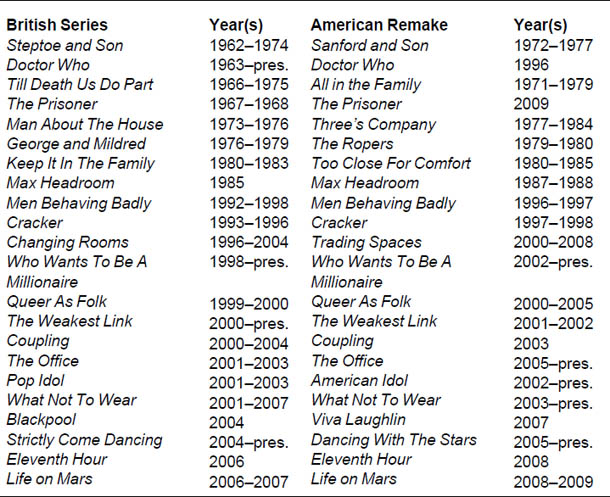
The Avengers, for example, was modeled as a Bond-type television show (with a Bond girl as a sexy lead) to promote a specific kind of sophistication that was coded British. But, as American producers began deliberately to remake successful British television shows, aspects of the programs that seemed to be particular to the local British audience became transformed into specifically American concerns, such as the topical episodes of Norman Lears 1970s sitcoms
Next page

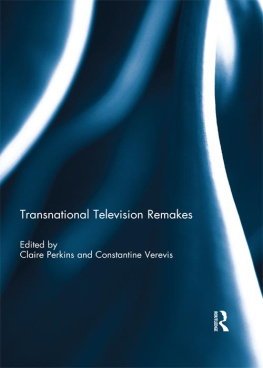


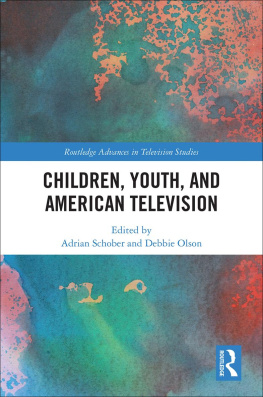
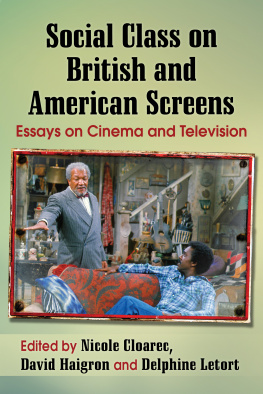

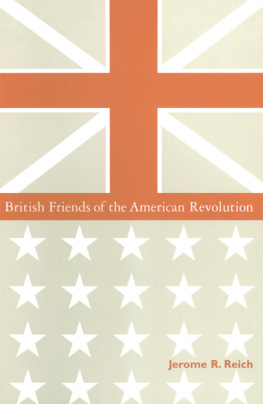

 The paper used in this publication meets the minimum requirements of American National Standard for Information SciencesPermanence of Paper for Printed Library Materials, ANSI/NISO Z39.48-1992.
The paper used in this publication meets the minimum requirements of American National Standard for Information SciencesPermanence of Paper for Printed Library Materials, ANSI/NISO Z39.48-1992.